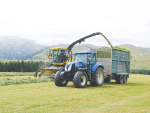RURAL CONTRACTORS ARE being urged to get themselves up-to-date with changes to transport regulations around the use of agricultural machinery.
A number of new rules came into force on June 1 this year – with more being implemented from today (November 11).
"However, not all the proposed changes will be in place until late 2014," explains Rural Contractors NZ president Steve Levet.
"It can be quite confusing at the moment with some of the old regulations still applying; so there is mix of old and new at present. Therefore it is important rural contractors – and farmers –familiarise themselves with the changes."
One of the more important changes, which is now in force, relates to how tractors are registered. A two-tier system for agricultural vehicles has been established based on a 40km/h operating speed. Vehicles operating below this speed will have no compliance other than they must be roadworthy.
"Tractor owners have to decide if they want to register their tractors as being able to travel at over 40km/h on public roads or not," Levet says. "If you opt for the former, then in effect your vehicle has to comply with rules and regulations which apply to other road legal vehicles and require the new simplified annual warrant of fitness for tractors."
Previously some heavier tractors needed to have a certificate of fitness, whereas now they just need a simplified warrant of fitness tailored for tractors.
Meanwhile the new licence endorsement now allows for a greater range of agricultural vehicles to be driven by the holder of a Class 1 (car) licence once they prove they have the skills to do so.
"Drivers will need a wheels endorsement on their driver's licence if driving a tractor over 40 km/h or any other powered agricultural vehicle under 40 km/h," Levet says.
Other changes have improved and simplified the rules on pilot vehicles, work time variation schemes, hazard identification and vehicle visibility.
From today (11 November 2013), agricultural motor vehicles – regardless of age – that operate at speeds exceeding 40km/h will now undergo an annual WoF inspection, rather than six monthly.
Changes to the registration classes for agricultural vehicles, exemptions for special vehicles and the application of RUC are matters which will be finalised in mid 2014.
Levet says that despite some confusion, rural contractors welcome the changes and the thinking behind them. He says the greater flexibility around work hours is particularly welcome.
"Contractors and farmers will no longer face the situation of a contractor having to stop work because they have exceeded their work hours for the day, when perhaps the job could be completed in another hour. The contractor will no longer have to come back the next day or the next day when the weather is suitable."
Levet advises any contractors who are unsure of the changes, or which regulations have been changed and which have yet to change, to contact Rural Contractors NZ or go to its website: www.ruralcontractors.org.nz to get help with the correct information.



















